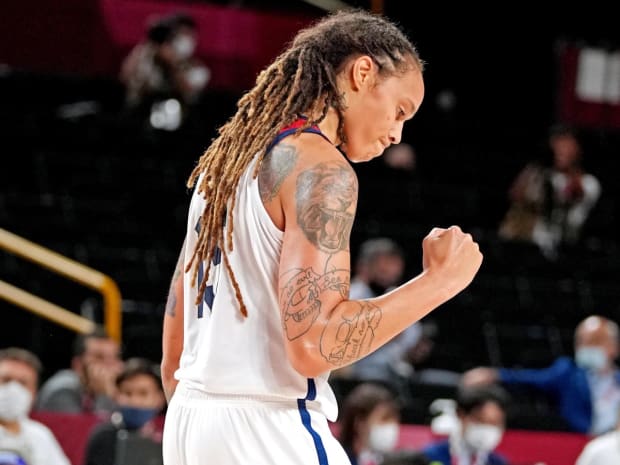This is how this was always likely to end: with WNBA star Brittney Griner being released in a prisoner exchange or something like it. The outcome seemed inevitable, and yet it was so hard to trust. Griner was going to be trapped in a Russian penal colony until she wasn’t. For her family and friends, the relief today is overwhelming.
Griner, who is 32, had been sentenced to nine years in prison. The full term would have forced her to miss the rest of her two children’s childhoods, it would have kept her away from her wife, Cherelle, for nearly a decade, and it would have ended her career—and even all that does not fully explain how this would have wrecked her life. A person does not come back from nine years in a Russian penal colony and casually walk back into her everyday existence. Every day that Griner spent there pushed her further away from her old self.
For the rest of us, this is the rare political story where we should all agree. I don’t care what your political party is or how you feel about literally any issue. A person’s life should not be ruined over carrying vape cartridges with cannabis oil.

Kyle Terada/USA TODAY Sports
Everybody should be happy for Brittney Griner today … even if you think the U.S. got the bad end of a trade.
Griner was swapped for Viktor Bout, a Russian arms dealer. President Joe Biden’s administration tried a two-for-one—Bout for Griner and corporate security director Paul Whelan, whom the Russians accuse of spying. The Russians refused. There are people who can intelligently discuss whether Griner-for-Bout was a wise move by Biden; it will shock you to learn I am not the best person to lead that discussion. But Griner coming home is a happy story. We should be able to separate it from any debate about the swap.
“This is a day we’ve worked toward for a long time,” Biden said. “We never stopped pushing for her release. It took painstaking and intense negotiations, and I want to thank all the hardworking public servants across my administration who worked tirelessly to secure her release.”
Throughout the world of basketball today, word is spreading about BG. For most of 2022, Griner was both out of sight and everywhere. Her fellow WNBA players talked about her all the time. NBA players brought up her name unprompted. At the recent game between No. 1 South Carolina and No. 2 Stanford, coaches Dawn Staley and Tara VanDerveer both wore shirts supporting Griner.
We live in a time of performative gestures, but the sentiment here was sincere. The basketball community is closer than that of any other major sport. Women and men share high school, college and professional arenas. Players connect in summer camps and through AAU programs. The best players compete together on international teams from the time they are teenagers. To people who spend their lives in basketball, Griner is not just a name or a political pawn. She is a beloved member of their community, and now she is coming home.
This would be a happy ending if it were actually an ending. It isn’t, really. We’ll see how much the time in Russia changed Griner—how traumatic it was, how difficult it will be to overcome. Griner probably doesn’t have those answers right now.
There are more questions. Some are geopolitical (What does this mean for U.S.-Russia relations?) and others are intensely personal. Pro basketball players will surely think about Griner when they consider offers to play in any country with an authoritarian or unstable government, and athletes in other sports should do the same.
The Griner story will reverberate in ways we can’t fully predict at the moment. Her life will never be the same. But at least she gets to live it, and what an enormous relief that is.







